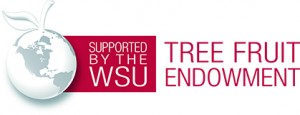News Articles
RosBREED Newsletters
Interested in staying informed about exciting developments in plant breeding, genetics, and genomics of rosaceous crops? Those crops include apple, cherry, peach, and pear, along with almond,…
A(nother) bad year for Little Cherry Disease
Written by: S.J Harper, WSU Plant Pathology. October 2018. The past year has been a bad one for the spread and incidence of little cherry…
Fall Fire Blight Considerations
With fall upon us and after the serious fire blight outbreak in Washington this year growers are asking questions. Here we discuss some considerations for…
Extension Technician Position Available
Join WSU’s Tree Fruit Extension Team. Nationally, Washington ranks first in the production of apples, sweet cherries, and pears. The Washington tree fruit industry contributes…
Green Lacewings – Know the Good Guys in your Pear Orchard
As part of a Pear IPM project we are tracking natural enemies in pear orchards and we wanted to share who is active now with…
Pear IPM Post Harvest Sprays
The end of pear season is finally upon us. One topic of discussion is the potential need for and strategy for postharvest sprays to manage…
Cherry Residue Study Results Available
For the eighth consecutive year, the Washington Tree Fruit Research Commission has conducted studies to provide the Northwest cherry industry basic information about residues of…
Mormon Crickets on the Move
There have been a number of reports of Mormon crickets recently, and sure enough, this is the time of year we start to see them…
Tree Assistance Program
TAP provides disaster assistance to eligible orchardists and nursery tree growers to replant or rehabilitate trees, bushes, and vines that were lost because of an…
Time to protect for doubling in Cherries
Those of you growing cherries that are sensitive to pistil doubling (e.g., ‘Bing’, ‘Tieton’, ‘Early Robin’) should consider protecting the crop during this period of…
